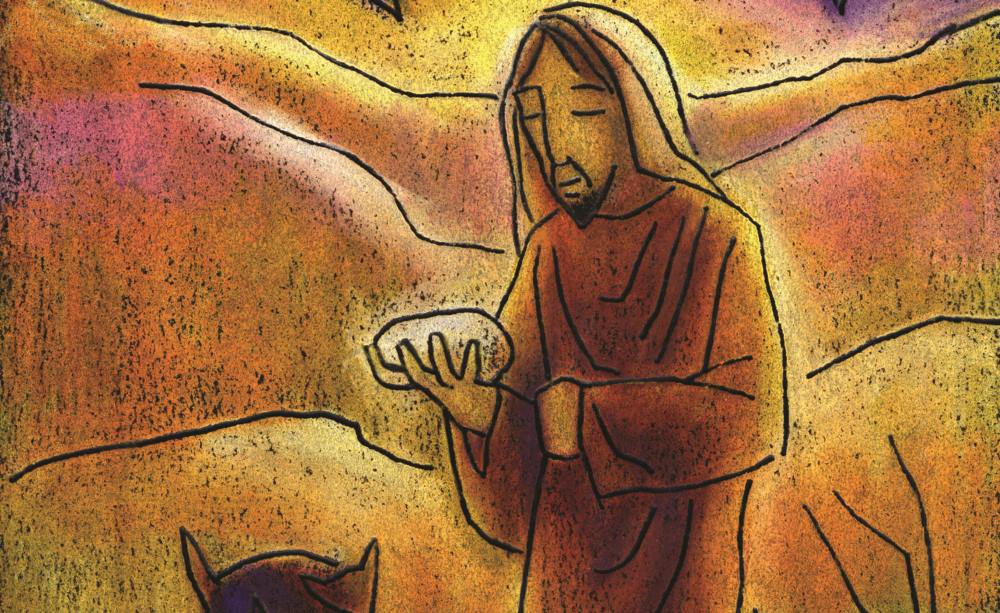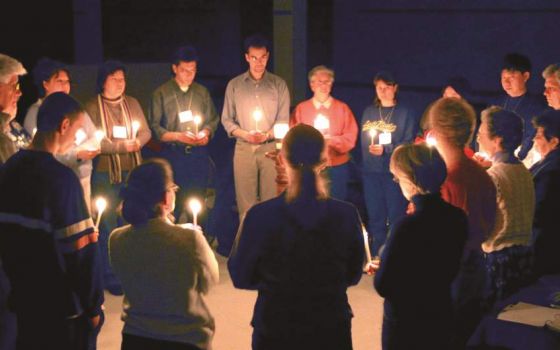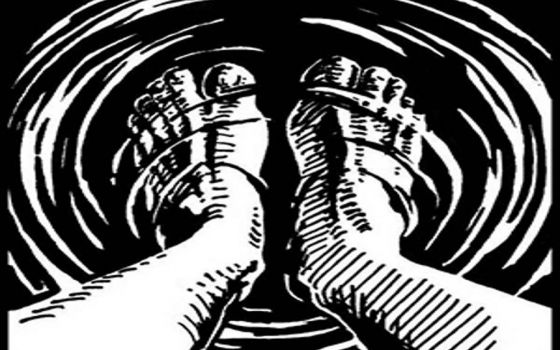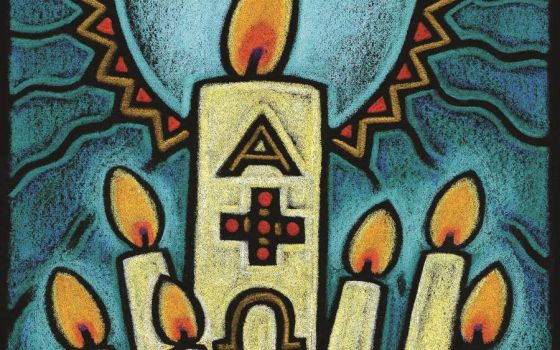
Art by Julie Lonneman
It is significant this year that the month containing the first four liturgical readings for Lent begins with the Eighth Sunday in Ordinary Time. The Scripture passages for that weekend set the theme for the other four.
Liturgical historians always remind us that Lent did not begin as a penitential season. Originally, the weeks before Easter consisted in a joyful community preparation for the catechumens' baptisms and a yearly reminder of everyone's own baptism. Only when the church's drastically increased penitents began to be absolved on Holy Thursday, and catechumens began to be baptized on days other than Easter did the penances most of us experienced as children replaced the joy our ancestors in the faith had originally experienced. Eventually, Lent stopped being a time of happy revival and morphed into a period we all dreaded.
Fortunately, the reforms if the Second Vatican Council have encouraged us to return to at least some of those baptismal themes, reminding us of what that sacrament means in our lives, as does the first Sunday of this month, the Eighth Sunday of the Year. Our liturgical readings stress that we should be people who actually do what God asks of us, not just think or talk about doing those things.
During my high school days, people who rarely did what they talked about doing were frequently referred to as "NATO" — no action, talk only. From today's first and third readings, it is obvious such individuals existed long before my teenage years. More than 2,000 years ago, both Sirach and Luke's Jesus demand to see the fruit. Talk is cheap, fruit is expensive. We can, for instance, be deeply motivated to achieve the "incorruptibility" Paul and his Corinthian community are intent on achieving, yet never get around to pulling it off. Such a goal, for one reason or another, is always in our future, not our present. The fruit which the author of Psalm 92 presumes we will produce in our "old age" simply never materializes. We just never get around to it.
I once made a motivational workshop in which we were instructed to write five things that we held as priorities in our lives on the left side of a piece of paper. Then, on the right side, list the last time we actually did one of those things. What I wrote was embarrassing for me — years for some, once or twice in my lifetime for others. My mind had played tricks on me. Because I thought them important, I presumed I was actually carrying them out.
Such psychological confusion is one of the reasons the early church was convinced we all need a Lent; not a time to give up things we like, but a few weeks to do a gut-check on what we are actually doing or not doing because of the faith we profess.
Our diocese once had a regulation that every priest have a file in which he kept all the bishop's letters; a guarantee against the oft-heard clerical defense, "I never heard that the bishop wanted us to do that!" The black and white proof of the bishop's will was always in our up-to-date file cabinets.
Christians do not need file cabinets to back up God's will for us; among other reminders, we have Scripture. No doubt that was the intention behind the original readings our faith ancestors chose for Lent. They simply did not want their communities to forget the essentials; some of which still stand out in our present liturgical formulas.
This is certainly the case with the First Sunday of Lent. We are never, for instance, to forget we are playing a role in salvation history. Just as Moses reminds his people in Deuteronomy that they are in a long line of Israelites who have committed themselves to Yahweh, so Paul reminds the Christian community in Rome that they are part of a larger people — both Jews and Gentiles — who have committed themselves to imitating the risen Jesus in their midst. Among other things, their commitment includes experiencing the same temptations Luke's Jesus endured and overcame during his earthly ministry. Along with the psalmist, we are convinced God will eventually deliver us from the evil we encounter; yet we are never given a definitive date for that event.
We should emphasize the importance of the Genesis 15 passage heard the Second Sunday of Lent. It contains the biblical basis for Paul of Tarsus' argument that one can be a Christian without first becoming a Jew. During Paul's day and age, most Jews obligated themselves to keep the 613 Mosaic Laws, regulations which Yahweh gave the chosen people on Mount Sinai; in our calculation, about 1,200 B.C.E. That meant Abraham — the first Jew — couldn't have been "righteous" since he lived more than 400 years before Moses.
Paul argues in Romans 4 and Galatians 3 that Abraham was righteous — doing what Yahweh wished him to do — simply by putting his faith in Yahweh. So according to Genesis 15:6, one didn't have to be a Jewish keeper of the Sinai laws in order to be righteous; even non-Jews could imitate Abraham's faith.
Though the patriarch's faith in Yahweh didn't entail keeping those specific Mosaic regulations, it consisted in doing whatever Yahweh wished him to do; many more than just 613 specific "works." Jesus, whom we imitate, includes everything in our faith that is necessary to give ourselves to others as he gives himself to us.
Obviously, everyone who goes down the path of that faith isn't always able to maintain such determination for a lifetime. Paul brings up some of their most egregious missteps in writing to the Philippian church. He can only hope and pray they eventually "stand firm in the Lord."
Other Christs who can pull that off will certainly be transfigured just as Jesus' resurrection transfigured him. In the meantime, we live in an ordinary, day by day world, only glimpsing the things the historical Jesus glimpsed when he carried through on what God asked him to do. As terrific as those glimpses are, we must always include Psalm 27 in our prayers. God's face is frequently "hidden" from us, even when we are doing what God wants us to do.
The late Carrol Stuhlmueller shared one of the most helpful insights into the Third Sunday of Lent's Exodus pericope I have ever heard: The angel does not "cue the bush" when he sees Moses coming down the road. He doesn't have to; it was already on fire. It was always burning. Moses simply notices something everyone else overlooks. Like all common phenomena, Sinai furze bushes are so plentiful that people actually stop looking at them. Because they take their commonness for granted they don't even see them. Moses is the exception; he sees the fire. He alone perceives the divine in the most common of things.
Advertisement
Yet God's biblical calls go beyond just seeing what others overlook. That is why it is unforgiveable that verses 9-12 of our Exodus liturgical reading have been omitted. It is in those lines that Yahweh tells Moses how he (Moses) personally is going to pull off this liberation thing. Contrary to popular religion, Yahweh rarely just jumps into action when we pray and instantly answers our petition. Almost always, the biblical God simply points out the path we are to take to have those prayers answered, a path which depends on our own actions. If we refuse to personally act, our prayers frequently go unanswered. True faith not only surfaces the problem, it also provides us the means to eradicate the problem. Whether we like it or not, God never expects us to be spectators in the stands applauding; we are to be on the stage. With sight comes responsibilities.
No matter what "otherworldly" experiences we have, if we don't act on them, they are worthless. Paul warns his Corinthian community about that fatal flaw in how we live our faith. Going back to the greatest of all Jewish experiences, the Exodus, Paul reminds his readers that only a few of those miraculously liberated Israelites who crossed the sea actually reached the promised land. Though marvelous things happened to the chosen people, unless they actually followed up by doing what Yahweh commanded, these tremendous events were worthless. The final Exodus only happened to those who actually did the things necessary to bring the Exodus about.
Jesus points out to his followers that God can be unbelievably patient with us, constantly giving us a chance to "bear fruit." That is echoed in Psalm 103 when the psalmist sings about Yahweh being "slow to anger and abounding in kindness." Yet if we eventually refuse to change our value system — to repent — we are no different from total strangers would be to him/her. At some point in our personal salvation history, we have got to act.
We especially see some of the implications of those actions on the Fourth Sunday of Lent. Like the Israelites who finally make it into the promised land, we are responsible for some of things on which we formerly relied on God. As Yahweh reminds Joshua, the days of feeding the chosen people with manna are over. Twelve centuries later, the author of 2 Thessalonians couldn't be more blunt: "If you don't work, you don't eat!" Somehow or another, we have got to participate in our own well-being.
For those who work at being other Christs, that work revolves around carrying on the ministry of the Christ. Paul sees that as a ministry of "reconciliation." He points out to the Corinthians that such a ministry consists in being one with those around us. Just as the historical Jesus helped us become one with God — no matter our sins — so we should become one with others — no matter their sins. Pope Francis could not express that ministry better than on those occasions when he encourages us to "build bridges instead of walls." Our bridge-building is not a reward for individuals being good. It has nothing to do with their behavior. It revolves around our own.
That is why today's well-known parable is so significant. It is much more a reflection on the "prodigal father" than on the "prodigal son." Both go overboard; but, as disciples of the risen Christ, we should be imitating the father's prodigal behavior, not the boy's.
Unbelievably, this parable was never heard liturgically on a Sunday in the Catholic Church until after 1970 and the Vatican II reforms. And when I did hear it in catechism class, for some reason my teachers always left out Jesus' original reason for telling the parable: the older brother. Those who stubbornly support his position are the people Jesus is trying to reach. They triggered Jesus' parable. This hard-working, fair-minded son wants to create a world in which everyone is treated equally, a world in which everyone gets his or her "just desserts." Yet Jesus wants us to go beyond equality, to always act with love. If we, imitating the psalmist, strive to relate to a God who "delivered (us) from all (our) fears," we must also imitate God's actions of generously loving those around us.
As other Christs, we are obligated to do much more than just think about giving such love.
Editor's note: This reflection was originally published in the March 2019 issue of Celebration. Sign up to receive daily Lenten reflections.








